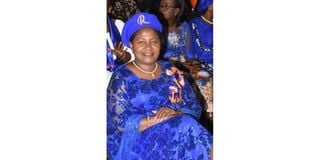Senator Beth Syengo’s solution to gender rule impasse

Nominated Senator Beth Kalunda Syengo. She has sponsored a Bill to help realise the two thirds gender rule in Parliament.
What you need to know:
- The senator has proposed changes to four articles of the Constitution to help entrench the rule, which remains elusive in Parliament after more than 10 bids.
- The nominated lawmaker is Maendeleo ya Wanawake Organisation’s deputy national treasurer and ODM's Women League president.
At least 10 attempts to enact a law that would actualise the two thirds gender principle hit a snag in the 10th, 11th and 12th parliaments.
The Supreme Court had advised Parliament to provide for mechanisms to implement the gender principle by August 27, 2015. Unable to attain this, the National Assembly extended the deadline by one year, in line with its constitutional discretion. It could only do so once. And seven years past the deadline, the gender principle remains a hard nut to crack.
President William Ruto, through his memo dated December 9, 2022, also threw the ball in the court of the 13th parliament, asking legislators to hasten legislation to effect the principle and ensure no gender is under-represented in the National Assembly and the Senate.
But Senator Beth Kalunda Syengo believes she has a formula that could crack the elusive gender rule. The Orange Democratic Movement (ODM) party lawmaker—through her Constitution of Kenya (Amendment) Bill, 2023, which has been committed to the Justice and Legal Affairs Committee and is due for second reading and debate on August 1—proposes that the gender whose representation is below the one third threshold get additional nomination slots.
The nominated lawmaker wants changes to four articles of the Constitution – 80, 90, 97 and 98 – to entrench the rule. She proposes the introduction of a clause in the Constitution that would ensure the composition of Parliament complies with the requirement that not more than two thirds of its members are of the same gender.
The Bill wants the number of special seats to be determined after the declaration of the results of a general election. Currently, the National Assembly has 349 members and the Senate has 67, including 12 and 20 nominated legislators respectively. But if the Bill sails through, the number of lawmakers could go up beyond 416.
Economic empowerment
Ms Syengo, who is also the Maendeleo ya Wanawake deputy national treasurer, has also sponsored the Cotton Industry Development Bill, 2023, which seeks to boost a sector that has been struggling for years and create jobs for women and the youth.
She proposes the creation of a body, to be named Cotton Industry Development Board, to, among other functions, market cotton products and by-products in both local and foreign markets, and facilitate farmers’ access to financial support and seeds.
The Bill further seeks to compel the counties to maintain an up-to-date register of growers and cooperatives, and offer extension services.
“The counties will provide training, extension services and disseminate information to cotton farmers, farm workers and processors relative to production technology, market systems, farm work, entrepreneurial and other technical skills and values, attitude formation, and socioeconomic development strategies,” she says.
“The cotton industry was once a major foreign exchange earner whose collapse led to massive loss of revenue to the government and farmers. This was due to myriad obstacles such as regulatory challenges, and national and international economic realities.”
Ms Syengo resigned from her teaching job after 15 years of service to vie for Mwingi North parliamentary seat in 2007 but lost to Wiper leader Kalonzo Musyoka, who, until then, had uninterruptedly represented the constituency in Parliament since 1985.
“I lost majorly because of several factors that favoured Mr Musyoka, who is a seasoned politician. But I remained unbowed and ventured into party politics in 2012, rising to the position of president of ODM Women League, which I still hold,” says the politician, who is an alumna of the Kitui County-based Mulango Girls’ High School.
“ODM’s Women League is an organ created under articles 6.3.14 and 7.9 of the party’s constitution to articulate women's issues.”
Before the August 9, 2022 General Election, Ms Syengo had set her eyes on the Embakasi South parliamentary seat, but Azimio la Umoja leadership implored her to step down for the incumbent, Mr Julius Mawathe, to minimise the chances of the seat slipping away because of sibling rivalry within the coalition.
“I withdrew my candidature for the Embakasi South parliamentary seat. However, ODM considered me for nomination to represent the interests of women in the Senate,” she says.
Ms Syengo, an expert in community development and transformational education, holds a Master of Arts in Community Development and a Bachelor of Education from Kenyatta University.
In the Senate, she is a member of three committees—Agriculture, Livestock and Fisheries; National Cohesion, Equal Opportunity and Regional Integration; and Procedures and Rules.
She attributes her success to her father, a police officer then, who educated her at a time when girls’ education was never a priority in many African communities. “A girl's place was in the kitchen. But my father decided to cast his lot with me and it paid off,” she says.
“My dream is to see a country where both men and women are given equal access to opportunities,” she adds.
Ms Syengo is also the national women leader for the 22 Kamba clans under the Kamba Elders Governing Council. She is the proprietor of Kava Mama Education Centre in Mwingi, Kitui County.





